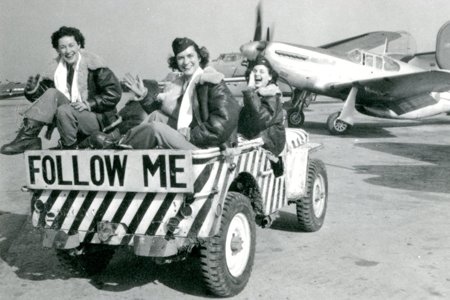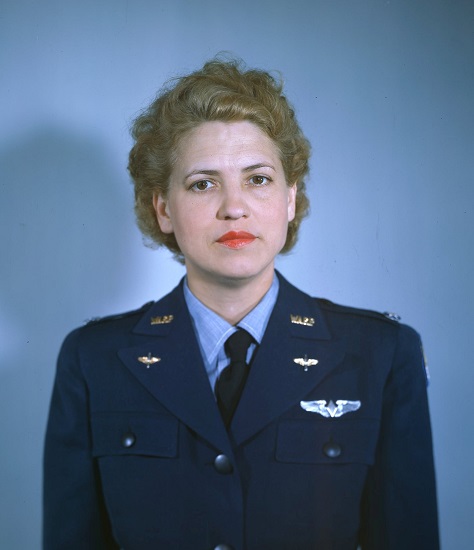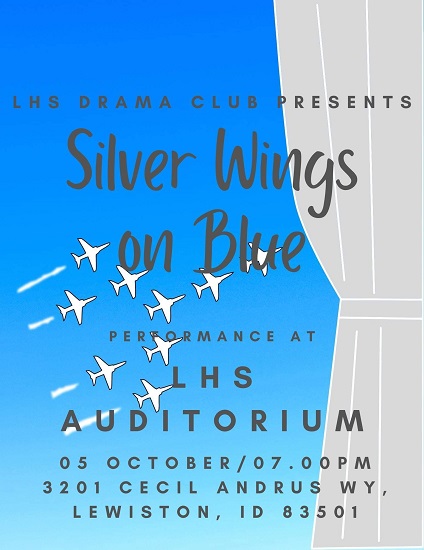Last fall, I enjoyed seeing a play I’d written early in my playwrighting life staged again. As a writer, I tend to not go back over my old stuff. I want to keep pressing forward. I’ve returned to old history articles to refresh my memory, but I stay away from my creative endeavors. I have the rich potential to rewrite forever and never create a new story or article.

Silver Wings on Blue was fun to revisit. It began as a passion project—most of my writing does.
A 1996-ish trip to the Seattle Museum of Flight introduced me to the Women’s Airforce Service Pilots (WASPs) and their role during World War II ferrying military aircraft and towing targets for nascent gunners. Being an aviator buff since I was a child, I was annoyed that I’d never heard of them. I’d prided myself on a good general knowledge of the history of flight. That a role model starved kid like myself had somehow missed these women—well, where had they been all my life?! Right in plain sight as it turns out.
The amazing feats of Jacqueline Cochran, self-made woman and renowned aviator also wowed me. That she was involved in the creation of the WASPs and making it possible for getting women flying military aircraft just lit up my brain.

I dug up everything I could about them. My quest ultimately led to a trip to the Texas Woman’s University (repository of the WASP history), a return trip to Seattle where I met some WASPs in person!! More wows! And finally I wrote a play about them.
I wasn’t in town for the first production of the script. Down at the Oregon Shakespeare Festival, I received emails from the director, the sublime Angel Katen. She handled the production while I handled scenery in three different theatres. I arrived at the end of my contract to catch a couple rehearsals and the performances.
A second production followed quickly thereafter and then that was the end of that script’s performance history. Which was more my fault than anything else. It never occurred to me to look for more. Never one for self-promotion, I sent out a few queries then set it aside to work on the next project.
Time passed as it always does. Melissa Syverson, one of the actors in the second production became a drama teacher and we reconnected some 20 years down the road. She was interested in doing the script at her high school. By then the script was in an obsolete software format. More time passed until I transferred it into a current program and edited the formatting so it would print correctly.
When I wrote Silver Wings, it was one of the only plays on the WASPs I knew of. Again, late ‘90s, the internet was just coming into being. And during the intervening years, I saw more books published on them, stories of the individual fliers, then the group received the highest civilian honor – the Congressional Gold Medal and a White House reception.
Last summer the script was finally updated. To my surprise, it had held up over the years. I was NOT possessed with an urge to bury it in the backyard and tell Melissa that it was beyond recovery. Her students read it and they decided to produce it.
It was a delight to see the light in those students’ eyes as they learned about these intrepid aviators. There was also cringing when they read through common practices of the 1940s—like restaurants not serving women wearing slacks. I saw in them a kindling I myself had experienced so many years ago.
They dove into it, and I found myself curiously free of the frets I am bedeviled with when a script is new and getting its first productions. Granted I was a young writer then, but new scripts are delicate creatures for me. I’m trusting my collaborative team to bring the story to life. This while I’m still rewriting, still trying to do justice to the story.
With this production, I was able to enjoy rehearsals and performances. I answered questions and did my best to be there for them. They produced the script, discovered history relevant to them, and learned how the efforts of these women had impacted their lives. And as Melissa had continually told me, the story of the WASPs is still relevant today and people still need to hear it.
